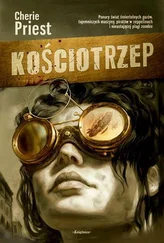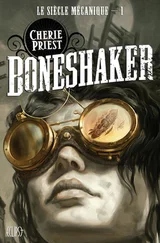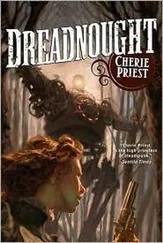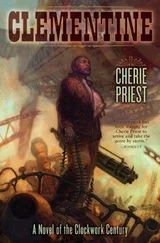Grant did not know if the Lord would forgive him for this particular trespass. But there were so many other things in the heavenly queue for which he was even less likely to be forgiven that he didn’t worry about it too much.
If everything went as expected, he’d have at least three hours before Fowler could possibly return. His office should be deserted, locked up for the Lord’s Day, with no potential spies or villains there to report to the Secretary that the president had been up to no good.
And inside that office, he expected to find … what, precisely?
Evidence? Information? Leverage?
He didn’t know, but he was tired of being left in the dark by those he’d appointed to assist him; he was exhausted and ashamed for feeling useless in the great seat of power, with no power to speak of except what was granted to him by subordinates.
Well by God, he would not be left in the dark anymore.
Though, if he had a drink, he was reasonably certain he could do something about that headache.
No. Clearheaded was the only way to proceed, even if that clear head came with a cost. He couldn’t seize control of his life and his administration as a sick old drunk, so he’d do it as an angry sober man with nerves of steel and shaking hands. The people had elected him. They’d hired him, and they depended on him, and he’d turned over the henhouse to the foxes because he hadn’t known what else to do.
Here was a chance to redeem himself, through petty crime with an ethical underpinning. He could trust no one—at least, no one he felt comfortable endangering.
The buck stopped here, at Fowler’s office, where he would break the law and save the nation … or maybe that was a grandiose delusion of an old drunk. But he liked the sound of it, so he rallied around it as he quietly stalked the hallways.
Yes, he could admit it to himself: His third presidential term had been weak. He’d overheard whispers about how he shouldn’t have taken the post again—that he ought to have left office in favor of going on a speaking tour, or writing his memoirs, or some other entertainment to which he’d be equally ill-suited, in his opinion.
But no, he’d stuck with the job. Not for Fowler. Not for Congress. Not for the courts, nor the lawyers, nor the slick, strange men who made their money on the misery of others—on weapons, murder, and government contracts.
Not for them. But for everyone else.
For the abolitionists and the people of color who he refused to think of as slaves, even down in Mississippi and Alabama, where the Southerners still called them that. The Southerners were wrong, and he’d show them the hard way if he had to. But they’d insisted upon that, hadn’t they?
He stayed in office for the soldiers, old and young—the ones who’d lost limbs and lost sleep, the ones who’d gone home only to die slowly of the sudden confusion of not having anything to fight for. He did it for the ones who’d rather end it quickly, even after they’d slipped through the corpse-catching sieve of the front and were given the chance to begin again.
He stayed for the ones who never got the chance. Who never came home. Tens of thousands of them, hundreds of thousands now. More like a million, when you factored in everything—the disease, the suicides, the civilians … and the walking plague.
His reverie was interrupted when he reached the door bearing Fowler’s name. It was painted on the frosted glass door in the expected fancy letters, for a fancy man who thought he knew better than everyone else. Grant had once believed it, too, that Fowler was the smartest, the cleverest politician of them all.
And now? Goddamn, but he hoped he was wrong.
He reached for the knob, but its firm, reassuring lock suggested that a smith would be required to compromise it. The president didn’t have a smith handy, and he didn’t feel like calling one. Instead, he had the silence of this particular hall, confidence that the office’s occupant was absent, and a hammer hidden inside his coat.
He wrapped the hammer in his scarf and shattered the door’s glass with one heavy swing.
Before the last clattering, clinking shards had fallen to the office floor, Grant jammed his hand into the hole and unlocked the door from within.
Was this a crime? Perhaps.
Was anything a crime, if the president authorized it? An excellent question, and one he’d put to Lincoln the next time he saw him. A good philosophical starting point for a conversation over brandy—he could imagine it now, and he did so with great anticipation, particularly with regards to the brandy. He’d been dry for hours, and those hours were starting to tell.
The door scooted open, scraping the broken glass aside and clearing a rainbow-shaped path on the enormous rug that filled most of the room.
“Close the door behind you, if you don’t mind.”
He froze, one hand on the knob.
“Not that we can have a private chat at this point, given the state of the door, but I would appreciate the gesture all the same. Mr. President?”
He found his voice. “Yes?”
“The door. ”
Slowly, he drew it shut until it clicked into the frame.
Katharine Haymes was seated behind Desmond Fowler’s desk, more perfectly at home than if her own name had graced the glass before it was broken. She wore a pair of reading glasses, which she now took off and set on a dictionary that Fowler had probably never opened. “Please,” she urged, gesturing with a pen in her hand. “Won’t you sit down?”
The president’s head swam with confusion and embarrassment, but a fresh infusion of anger steadied it. “I will, but not at your request. This isn’t your office to occupy, Miss Haymes.”
“Nor yours to vandalize, Mr. President. Let’s have a civilized talk instead, shall we?” As he made his way to one of the chairs that faced the desk, she added, “Could I make you a drink?”
“You’d like that, wouldn’t you? Get me off my toes and into my cups.”
“I’m only being courteous. Why? Are you implying that I might do something untoward if I could compromise your faculties?”
“No such thing was implied,” he responded, trying to keep the hint of defensiveness out of his voice. But he was off-kilter already, thrown by the situation. He wouldn’t have admitted it, but the drink might well have sharpened him.
“Well, in my experience, people who break into offices rarely have polite intentions, so you’ll have to pardon me. But you were going to do that anyway.”
“It doesn’t work like that.”
“It doesn’t?” She cocked her head. “Desmond tells me otherwise. But you and I both know that the world doesn’t run on his word. He certainly likes to think so, though, doesn’t he?”
Grant sniffed. “So what does that make you? The power behind the throne?”
“Oh no, don’t be silly. I stand behind no throne, Mr. President. Not his. Not yours.”
“But you came to us. You’re the one who needed a deal.”
She shook her head. “No, I didn’t need one. I merely wanted one, and Mr. Fowler made it easy for me. I don’t require your clemency any more than I require your affection or respect. My time and my money are my own, and I’ve never needed permission to make use of either. I won’t start asking now.”
“So why, then? What game are you playing at?” he asked, determined not to be led in circles.
“The same game I always play, and I always win.” She leaned back in the Secretary of State’s oversized chair. It made her look small, almost childlike.
Grant reminded himself that it was an illusion. “What are you so afraid of?” he asked her.
“Afraid?”
“Only the frightened are so hungry for power.”
Читать дальше










